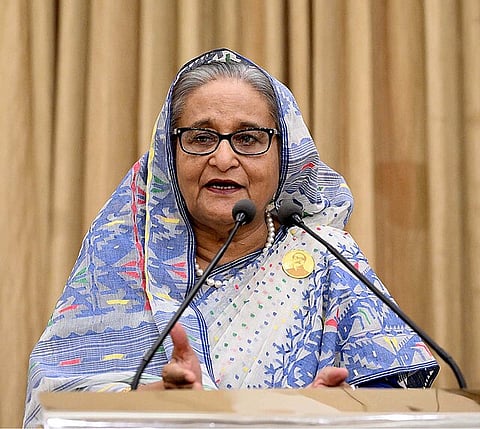

The interim government of Bangladesh has formally requested India extradite former Prime Minister Sheikh Hasina to face a death sentence, a demand that has become a flashpoint in the increasingly strained relations between the two neighboring nations. This request challenges India's long-standing alliance with Hasina and places New Delhi in a difficult diplomatic position.
Bangladesh's interim government, led by Chief Adviser Muhammad Yunus, has reiterated its demand for India to hand over Sheikh Hasina following her conviction and death sentence from the International Crimes Tribunal of Bangladesh. The tribunal found Hasina guilty of crimes against humanity for her role in the violent suppression of student-led protests in 2024, which according to UN investigators, resulted in approximately 1,400 deaths. A Bangladesh foreign ministry statement emphasized that handing over Hasina is India's "obligatory responsibility" under the existing bilateral extradition treaty. The request has been a source of public pressure within Bangladesh, with political figures questioning the purpose of official visits to India if not to secure Hasina's return.
In contrast to Bangladesh's direct demands, India has adopted a cautious and non-committal public stance. India's Ministry of External Affairs has stated it "noted" the verdict and remains "committed to the best interests of the people of Bangladesh," carefully avoiding any direct comment on the extradition request itself. This language is seen by regional analysts as a "clear refusal," signaling that India is highly unlikely to extradite a long-time ally. Experts suggest India's extradition treaty with Bangladesh contains a "political offense" exception, which New Delhi could invoke to refuse the handover, potentially arguing the charges are politically motivated. The prevailing expectation is that India will delay any definitive decision at least until an elected government is in place in Dhaka following elections scheduled for February 2026.
The extradition demand unfolds against a backdrop of significant rebalancing in Bangladesh's foreign policy and a consequent cooling of relations with India. Since the collapse of Hasina's government, which was one of India's most steadfast regional allies, the interim administration has sought to "de-Indianise" its foreign policy. This shift has been described by a Dhaka-based think tank as a move to "insist on its sovereignty," with the government vowing not to "pick sides" and to prioritize its own national interests. This rebalancing has included outreach to India's regional rivals, with high-level military delegations from Pakistan visiting Dhaka and caretaker leader Yunus making China his first official foreign visit. The situation is compounded by growing anti-India sentiment within Bangladesh, where one survey found just 11% of the public viewed ties with Delhi positively.
Despite the tensions, diplomatic channels remain open. The recent visit of Bangladesh's National Security Adviser (NSA), Khalilur Rahman, to India for a regional security summit included a meeting with his Indian counterpart, Ajit Doval. While the official readout stated they discussed the "Colonel Security Conclave and key bilateral issues," it was silent on whether Hasina's extradition was raised. The meeting, however, is seen as an attempt by both sides to foster a working relationship despite the ongoing friction. Reports suggest that behind the cordial atmosphere, India may be using the situation to press for significant concessions from Dhaka, including requests for special economic zones, expanded transit facilities, and limits on Bangladesh's cooperation with China and Pakistan.